There is nothing more inspiring than a person who, despite the challenges of a rare disease, finds solace in understanding without extensive explanations, lightens the burden of thoughts, and discovers answers to long-standing questions. The importance of care and empathy is often overlooked, but those with a rare disease truly understand their value. The defining characteristic of any group of Fabry patients is their unwavering willingness to support and comfort each other. In the journey of a rare disease, there are crucial elements that influence the quality of life, such as a knowledgeable and compassionate medical team, supportive family and friends, but the emotional understanding that one can find in a patient community is truly irreplaceable.

Living with a progressive rare disease like Fabry is a constant process of adapting to new symptoms and seeking answers. Whether newly diagnosed or managing the condition for years, patients and caregivers are on a perpetual quest for information, guidance, experience, and reassurance. No matter how well-versed one is in understanding symptoms, managing treatment, or navigating bureaucracy, there is always something new to discover, learn, share, or experience. This continuous learning and growth is a testament to the resilience and determination of rare disease patients and their caregivers.
Patient associations are the guiding lights in this journey, offering not just information but also emotional support. They offer encouragement, educational platforms, and avenues for self-understanding. They provide a safe space to share feelings and experiences, catering to a wide range of needs—whether it’s a silent understanding, an emotional connection, or a comforting hug. The essence of these associations lies in their ability to provide care and comfort, fostering a sense of community and belonging.
The Fabry International Network, dedicated to improving the lives of those affected by Fabry disease, organizes annual expert meetings to provide a platform for the exchange of knowledge, experiences, and ideas. Expert Meeting exemplifies a supportive environment by creating an ideal platform for sharing, encouragement, and connection. Attendees gain unique educational experiences through the latest advancements from healthcare professionals and best practices from around the world. This meeting underscores the importance of being part of a patient association, where shared knowledge and collective strength empower everyone involved.
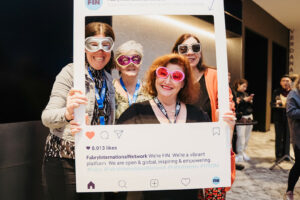
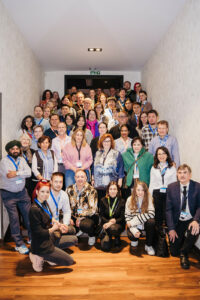
The 2024 Annual Meeting of the Fabry International Network (FIN), held this spring in the historic city of Prague, was an extraordinary event, bringing together patients, caregivers, and healthcare professionals. This year’s conference was marked by an engaging atmosphere that fostered learning, collaboration, and the sharing of best practices among both old and new members and emphasised the importance of integrating cutting-edge research with patient-centred care.
The meeting featured a rich program of scientific sessions, learning cafes, interactive workshops, and panel discussions, all designed to advance dialogue and inspire innovative solutions. Doctors presented the latest scientific findings, offering new insights into the pathophysiology of Fabry disease and potential therapeutic approaches. Meanwhile, patient advocates discussed best practices in managing the disease, highlighting the critical role of patient engagement in shaping effective healthcare strategies.
The meeting commenced with round-table discussions focused on resources, challenges, best practices, and priorities, aiming to share and learn from each other’s experiences. This initiative was highly successful, with strong engagement and interest. Moderators presented highlights and global best practices after two discussion sessions.
Day two featured scientific sessions and presentations from leading Fabry disease specialists. Professor Linhart shared the latest advancements in heart involvement, focusing on the progression of cardiac involvement based on the phenotypes and best possible roads to diagnosis.
The standard of care and the importance of a patient-centric approach were presented by Dr Ramaswami. A significant number of resources are available regarding organ involvement in Fabry disease, but there is almost no literature regarding patient well-being and care standards. Dr Ramaswami described the patient health and patient well-being assessment methods, the main objectives measuring patient-reported experiences and outcomes and their impact on quality of life. In the example of the UK, she presented the role of new technologies, such as apps, portals, and wearables, which can simplify disease monitoring and management. Patient engagement stages and strategies were further discussed also during the panel session.
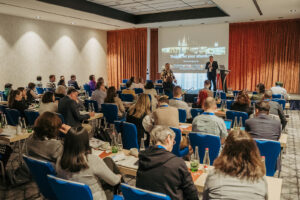
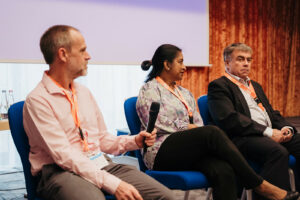
The perceptions of health professionals regarding their patients can differ substantially from a patient’s point of view. Dr Vujkovac provided a detailed analysis of critical patient parameters and identification methods. Unmet needs and quality of care can be assessed using surveys or scales like Patient-Reported Outcome Measures (PROMs) and Patient-Reported Experience Measures (PREMs). Collecting and analyzing these reports can significantly improve patients’ quality of life, care, and well-being, assist research and target the current gaps. This process can be summarized as: collect, analyze, and react.
Fabry disease affects both males and females, sparking discussions on whether the impact is equal or varies between genders. Dr Hopkins addressed Fabry disease in females, noting that 59% of female patients have active heart disease and 50% experience hearing loss. However, research on female health in Fabry disease is lacking, especially concerning different life stages such as pregnancy and menopause.
‘’ The ultimate measure by which to judge the quality of a medical effort is whether it helps patients as they see it ’’. Berwick 1997!
Dr Ortiz explained the criteria for treatment decisions and the importance of preventing disease progression. Professor Germain highlighted new treatments and trials, showcasing promising developments in Fabry disease research. The impact of current treatments on patient symptoms and complications was also inspiring, underscoring significant improvements in patient outcomes.
In most discussions about health, we often equate well-being solely with physical health, overlooking the crucial aspects of mental and social health. This oversight is particularly significant in managing Fabry disease, where disease-related stress is a common challenge. Dr Ali’s insightful session emphasized the importance of acknowledging and addressing mental health. She explained that understanding and scaling our stress is essential. Developing personalized self-care routines, connecting with peers, and sharing coping mechanisms can significantly improve our overall well-being.
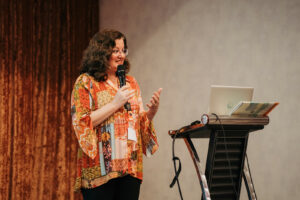

Following the scientific sessions, two workshops focused on health and pain management. These workshops provided a platform to openly discuss the state of health management in various countries, identify weak points, and brainstorm better options. In the pain management workshop, participants learned about the pain mechanisms in Fabry disease, different types of pain, and possible coping strategies. These sessions allowed ample time for participants to ask questions and engage in discussions with doctors, fostering a deeper understanding and personalized support.
During the weekend, new members of the Board of Directors were introduced, and the winner of the annual FIN award was announced. The Czech Republic Association received the award for their outstanding program for patient retreats. We encourage all FIN member associations to submit their proposals for next year’s award; submissions will open in November.
In summary, the 2024 Fabry International Network Expert Meeting in Prague was a resounding success. It provided a unique platform for patients and caregivers to learn about the latest advancements in Fabry disease therapy and diagnostics, emphasized the importance of the patient voice, and created a vibrant environment for building collaborations and sharing best practices. The insights gained and connections made during this event will undoubtedly have a lasting impact on the Fabry disease community, driving progress and fostering hope for the future. Love, encouragement, understanding, and empowerment best describe the weekend in Prague. We thank each of you for your participation and contributions, and we are looking forward to meeting you next year in Lisbon.
Article written by Tatevik Yezekyan, FIN Director

